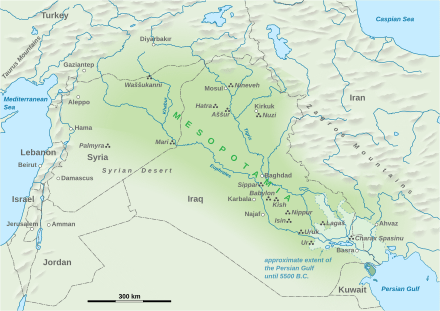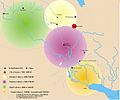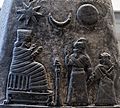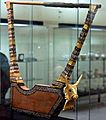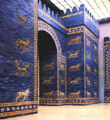Mesopotamia facts for kids
Mesopotamia (Greek: Μεσοποταμία) is a historical region of Western Asia situated within the Tigris–Euphrates river system, in the northern part of the Fertile Crescent, in modern days roughly corresponding to most of Iraq, Kuwait, the eastern parts of Syria, Southeastern Turkey, and regions along the Turkish–Syrian and Iran–Iraq borders.
The Sumerians and Akkadians (including Assyrians and Babylonians) dominated Mesopotamia from the beginning of written history (c. 3100 BC) to the fall of Babylon in 539 BC, when it was conquered by the Achaemenid Empire. It fell to Alexander the Great in 332 BC, and after his death, it became part of the Greek Seleucid Empire.
Around 150 BC, Mesopotamia was under the control of the Parthian Empire. Mesopotamia became a battleground between the Romans and Parthians, with western parts of Mesopotamia coming under ephemeral Roman control. In AD 226, the eastern regions of Mesopotamia fell to the Sassanid Persians. The division of Mesopotamia between Roman (Byzantine from AD 395) and Sassanid Empires lasted until the 7th century Muslim conquest of Persia of the Sasanian Empire and Muslim conquest of the Levant from Byzantines. A number of primarily neo-Assyrian and Christian native Mesopotamian states existed between the 1st century BC and 3rd century AD, including Adiabene, Osroene, and Hatra.
Mesopotamia is the site of the earliest developments of the Neolithic Revolution from around 10,000 BC. It has been identified as having "inspired some of the most important developments in human history, including the invention of the wheel, the planting of the first cereal crops, and the development of cursive script, mathematics, astronomy, and agriculture".
Geography
Mesopotamia is made up of different regions. Northern Mesopotamia is made up of hills and plains. Seasonal rains, and the rivers and streams come from the mountains. Early settlers farmed the land and used timber, metals and stone. Southern Mesopotamia is made up of marshy areas and wide, flat, plains. Cities developed along the rivers which flow through the region. Early settlers had to irrigate the land along the banks of the rivers in order for their crops to grow.
Peoples of Mesopotamia
Mesopotamia has been conquered many times, by many different peoples. It was the heartland of the Sumerian, Akkadian, Babylonian and Assyrian empires. As each new group moved into the region they adopted some of the culture, traditions and beliefs of the people who had come before. It was conquered by Alexander the Great (332 BC), the Parthians (150 BC), the Romans, the Persian Empire, the Arabs (7th century). It is still one of the most fertile (and therefore valuable) parts of the Middle East.
Ancient Mesopotamia begins in the late 6th millennium BC, and ends with either the rise of the Achaemenid Persians in the 6th century BC or the Muslim conquest of Mesopotamia in the 7th century CE. This long period may be divided as follows:
- Pre-Pottery Neolithic:
- Jarmo (~7000 BC– ~6000 BC)
- Pottery Neolithic:
- Hassuna (~6000 BC–? BC), Samarra (~5700 BC–4900 BC) and Halaf (~6000 BC–5300 BC) cultures
- Chalcolithic or Copper Age:
- Ubaid period (~5900 BC–4400 BC)
- Uruk period (~4400 BC–3200 BC)
- Jemdet Nasr period (~3100 BC–2900 BC)
- Early Bronze Age
- Middle Bronze Age
- Early Babylonia (20th–18th century BC)
- Early Assyrian kingdom (20th–18th century BC)
- First Babylonian Dynasty (18th–17th century BC)
- Late Bronze Age
- Kassite dynasty (16th–12th century BC)
- Bronze Age collapse (12th–11th century BC)
- Iron Age
- Neo-Hittite or Syro-Hittite regional states (11th to 7th century BC)
- Neo-Assyrian Empire (10th–7th century BC)
- Chaldea, Neo-Babylonian Empire (7th–6th century BC)
- Classical Antiquity
- Late Antiquity
Epic of Gilgamesh
The Epic of Gilgamesh is an ancient story about a relationship between Gilgamesh and his close companion, Enkidu. Enkidu is a wild man created by the gods as Gilgamesh's equal to distract him from oppressing the citizens of Uruk. Together they undertake dangerous quests that incur the displeasure of the gods. Firstly, they journey to the Cedar Mountain to defeat Humbaba, its monstrous guardian. Later they kill the Bull of Heaven that the goddess Ishtar has sent to punish Gilgamesh for turning down her advances.
The second part of the epic is about Gilgamesh's distressed reaction to Enkidu's death, which takes the form of a quest for immortality. Gilgamesh attempts to learn the secret of eternal life by undertaking a long and perilous journey to meet the immortal flood hero, Utnapishtim. The words addressed to Gilgamesh in the midst of his quest foreshadow the end result:
- "The life that you are seeking you will never find. When the gods created man they allotted to him death, but life they retained in their own keeping".
Related pages
Images for kids
-
Mesopotamian Marshes at night, southern Iraq; reed house (Mudhif) and narrow canoe (Mashoof) in the water. Mudhif structures have been one of the traditional types of structures, built by the Marsh people of southern Mesopotamia for at least 5,000 years. A carved elevation of a typical mudhif, dating to around 3,300 BCE was discovered at Uruk.
-
After early starts in Jarmo (red dot, circa 7500 BC), the civilization of Mesopotamia in the 7th–5th millennium BC was centered around the Hassuna culture in the north, the Halaf culture in the northwest, the Samarra culture in central Mesopotamia and the Ubaid culture in the southeast, which later expanded to encompass the whole region.
-
The Code of Hammurabi is a Babylonian legal text composed c. 1755–1750 BC. It is the longest, best-organised, and best-preserved legal text from the ancient Near East. It is written in the Old Babylonian dialect of Akkadian, purportedly by Hammurabi, sixth king of the First Dynasty of Babylon.
-
Epic of Gilgamesh, an epic poem from ancient Mesopotamia, regarded as the earliest surviving notable literature.
-
Clay tablet, mathematical, geometric-algebraic, similar to the Euclidean geometry. From Shaduppum Iraq. 2003-1595 BC. Iraq Museum.
-
The Queen's gold lyre from the Royal Cemetery at Ur. C. 2500 BCE. Iraq Museum
-
Bronze head of an Akkadian ruler, discovered in Nineveh in 1931, presumably depicting either Sargon of Akkad or Sargon's grandson Naram-Sin.
-
Striding lions from the Processional Street of Babylon.
-
Detail of Nebuchadnezzar II's Building Inscription plaque of the Ishtar Gate, from Babylon
-
Artist's impression of a hall in an Assyrian palace from The Monuments of Nineveh by Austen Henry Layard, 1853
-
A Neo-Assyrian relief of Ashur as a feather robed archer holding a bow instead of a ring (9th-8th century BC)
-
The Black Obelisk of Shalmaneser III. The king, surrounded by his royal attendants and a high-ranking official, receives a tribute from Sua, king of Gilzanu (north-west Iran), who bows and prostrates before the king. From Nimrud
-
Contemporary artwork depicting Babylon at the height of its stature.
-
"Winged genie", Nimrud c. 870 BC, with inscription running across his midriff.
-
The Ishtar gate was constructed in about 575 BCE by order of King Nebuchadnezzar II. Pergamon Museum, Berlin
-
The walls of Babylon, in Babylon
-
Ziggurat of Ur
-
A suggested reconstruction of the appearance of a Sumerian ziggurat
See also
 In Spanish: Mesopotamia para niños
In Spanish: Mesopotamia para niños


